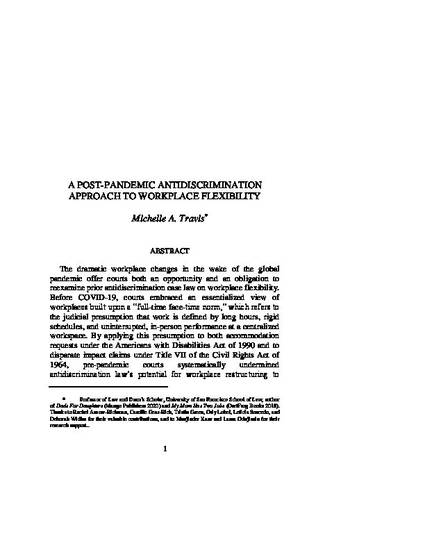
Article
Michelle Travis - Workplace Flexibility and COVID.pdf
Washington Journal of Law & Policy
(2021)
Abstract
The dramatic workplace changes in the wake of the global pandemic offer courts both an opportunity and an obligation to reexamine prior antidiscrimination case law on workplace flexibility. Before COVID-19, courts embraced an essentialized view of workplaces built upon a “full-time face-time norm,” which refers to the judicial presumption that work is defined by long hours, rigid schedules, and uninterrupted, in-person performance at a centralized workspace. By applying this presumption to both accommodation requests under the Americans with Disabilities Act of 1990 and to disparate impact claims under Title VII of the Civil Rights Act of 1964, pre-pandemic courts systematically undermined antidiscrimination law’s potential for workplace restructuring to expand equal opportunities for individuals with disabilities and for women with disproportionate caregiving responsibilities. This Article demonstrates how employers’ widespread adoption of flexible work arrangements in the wake of COVID-19—including telecommuting, modified schedules, temporary leaves, and other flextime options—undermine these prior decisions and demand a new analysis of antidiscrimination law’s potential to advance workplace flexibility.
Keywords
- workplace flexibility,
- employment discrimination,
- work/family,
- disability discrimination
Disciplines
Publication Date
Winter January, 2021
Citation Information
Michelle A. Travis. "Michelle Travis - Workplace Flexibility and COVID.pdf" Washington Journal of Law & Policy Vol. 64 (2021) Available at: http://works.bepress.com/michelle_travis/16/
